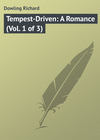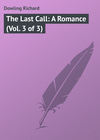Kitobni o'qish: «Tempest-Driven: A Romance (Vol. 1 of 3)»
CHAPTER I
IN THE DEAD OF NIGHT
It was pitch dark, and long past midnight. The last train from the City had just steamed out of Herne Hill railway station. The air was clear and crisp. Under foot the ground was dry and firm with February frost. All the shops in the neighbourhood had long since been shut. Few lights burned in the fronts of private houses. The Dulwich Road was deserted, and looked dreary and forlorn under its tall, skeleton, motionless, silent trees. There was not a sound abroad save the gradually-dying rumble of the train, and the footfalls and voices of the few people who had alighted from it. Little by little these sounds died away, and the stillness was as great as in the pulseless heart of a calm at sea.
Alfred Paulton had arrived by the last train. He was twenty-eight years of age, of middle height, and fair complexion. He lived in Half Moon Lane, and after saying good-night to some acquaintances who came out in the train with him, turned under the railway viaduct at Herne Hill, and walked in the direction of his home. He was in no hurry, for he knew his father and mother and sisters had gone to bed long ago. He had his latch-key, and should let himself in. His ulster covered him comfortably from neck to heel. He had supped pleasantly with a few friends at his club, the Robin Hood, and earlier in the day finished, a very agreeable transaction with his solicitor, and now had in his pocket a handsome bundle of notes.
As he walked he swung his stick, and hummed in a whisper a few bars from the favourite air of a comic opera which he had been to hear that evening.
Suddenly he started. As he was directly opposite the door of a house, standing back a few yards from the road, the door opened noisily, and he heard a woman's voice in a tone of piteous entreaty exclaim:
"Oh, what shall I do-what shall I do?"
Alfred Paulton drew up and listened. For a while all was silent.
He looked over the paling, which was just as high as his chin. In the doorway of the house stood the figure of a woman against the light of a lamp on a table in the hall. The leafless boughs of the intervening shrubs prevented his getting an uninterrupted view, but he could in a brief glance gather a good deal.
The figure was that of a woman neither tall nor short, neither stout nor thin. She was evidently not a servant. She wore an ordinary indoor costume, and had nothing on her head. Although she had scarcely moved since the opening of the door, he came to the conclusion she was of alert and active habit. He judged her to be neither old nor young. Her hair shone raven-black in the lamplight. The illumined cheek was finely modelled, dark in hue-that of a brunette. She leaned forward into the darkness, and peered right and left, moving her head but slightly as she did so. Something glittered in the starlight at her throat and at her girdle. Her hands were held behind her to balance the forward inclination of her body. On her fingers jewels sparkled in the lamplight of the hall behind her.
All this he saw at a glance. He was perplexed, and did not know how to act. It was scarcely fair in him to stand there eaves-dropping, as it were. If he moved now she would hear him, and know he had seen her and had stopped to listen. If he spoke he might alarm her.
Up to the moment the door opened and she appeared and called out, he believed this house to be empty. It had been vacant for a long time. Now he recollected having heard that it was let at last, and that the new tenant was expected to arrive this day. The place was called Crescent House. He had heard talk about the new-comers at the breakfast-table that morning; but nothing seemed known of them except that they came from a distance and were well off.
The woman in the doorway now straightened herself, raised both hands to her forehead, and moaned out in a lower and more despairing tone her former words:
"Oh, what shall I do-what shall I do?"
He could hesitate no longer. It was plain she was in a sore strait. He coughed, advanced to the gate, and, putting his hand on the latch, said:
"I beg your pardon. Is there anything wrong?"
She started back a pace into the hall. In doing so her full face met the lamplight for a moment. It was a very beautiful face, full of terror.
"Do not be alarmed," he said softly; "I was passing when you opened the door, and I heard you speak. Is there anything wrong? Anything I can do for you?"
She seemed reassured, and stepped once more to the threshold, and said, in a quick, low voice:
"I am a stranger here. I came to this house only to-day. I am alone with my husband in the house, and he has been seized by sudden illness. I do not know where to find a doctor, even if I could leave the house, and I cannot go away from my husband."
"In what way can I be of use? Pray command me."
He tried to open the gate, but failed.
She perceived his efforts to open the gate, and once more withdrew a pace into the hall, crying in alarm:
"No, no; you must not come in! If you wish to help me, go for the nearest doctor. Go at once. Do not stand there. In heaven's name, do not lose a moment! Go, I implore you."
She clasped her hands, and held them out towards him in entreaty.
"As you wish," he said. "I shall not be many minutes."
He turned and ran back towards the railway station. Dr. Santley, the family physician of the Paultons, lived close by, and Alfred Paulton resolved to summon him, although he might not be exactly the nearest medical man. Time would be gained rather than lost by going for him, as Santley would come at once without waiting for explanations-that is, if he were at home.
On his way he had little space to think, the time being short and the pace quick. He was more lucky than he had hoped, for he almost ran over the man he sought at the gate of his house.
"Oh, doctor," he cried, almost breathless, "I am so glad to meet you up and dressed! I want you, if you will be good enough to come with me at once."
"Mr. Paulton, I'm sorry. What is the matter? I have just come back from another unexpected patient.
"It's no one at our place, thank goodness! It's some one at Crescent House. I don't even know the name."
By this time both men were walking rapidly towards Half Moon Lane.
Dr. Santley was a tall, slender man, with full black beard and moustaches. He had a quiet, gentle, responsible manner, and rarely smiled. As the two strode on together, Alfred Paulton described the scene in which he had just taken part. When he had finished, his companion said:
"Ah, I saw the vans at the door to-day; but surely they cannot have got a big house like that straight in so short a time. Here we are."
They had arrived at the spot where a few minutes before the younger man had stood and spoken to the strange woman in the doorway. The door was now not open.
Paulton rattled noisily at the gate, and then waited a while. There was no answer. He looked at the windows of the house; none was lighted up. Light shone in the fan-sash over the door.
"You cannot have mistaken the house in the dark?" asked Dr. Santley, suppressing a yawn.
"Impossible! It was the only house to be let. It is Crescent House, and you yourself saw the furniture going in to-day."
Again he rattled the gate, this time as loudly as he could.
At length the door of the house was opened slowly, and against the light of the lamp the same figure as Paulton had seen before was revealed. Again the woman stood still on the threshold and leaned out into the darkness. This time she at once turned her face towards the gate.
Before either of the men had time to speak, she said in a calm, low, penetrating voice:
"Is the doctor there?
"Yes," answered both in a breath.
"I will open the gate in a moment."
With a firm, swift step she left the doorway and trod the gravelled path leading to the gate. She did not hesitate or fumble at the latch. In a few seconds the gate swung open.
"This is Dr. Santley; he is our family physician. He and I live close by. May I offer you my card? I and my family will, I am sure, feel delighted to be of any service to you," said Paulton, raising his hat.
"Stay," she said. "Will you both come in? I am terrified. I do not know what has happened. I hope you are not too late."
Her words were measured and her tone calm. Although the trees overhead were leafless, where she stood was dark, and neither of the men could see her clearly.
Without further words she led the way back to the house. The two men followed in silence. When they entered the hall she turned round in the full light of the lamp, and, stretching out her right arm towards the first door on the left, said:
"In that room. I shall wait for you. There is no other light. Take this lamp."
Paulton now saw her fully. She was dark, almost swarthy. There was no colour in her cheek. Her forehead was small and compact. Her eyebrows and hair jet, glossy. Her eyes were dark, large, a little sunken, brilliant, and full of suppressed fire. The nose was slightly aquiline. The only relief to the dark hue of the face and the black of the eyebrows, hair, and eyes, was afforded by the full, red, ripe lips. And all the features, the forehead, the nose, the chin, the mouth, the cheeks, were finely modelled. The face was commanding, imperial, triumphant. It was as set and firm as marble. It was the face of an empress born to lead her legions to victory-of a woman in whom courage was a matter of course, who regarded obedience to her wish as a spontaneous offering. She had the immortality of indestructible will in her face, the weight of irresistible determination.
With the face ended the heroic aspect of the woman.
At her throat blazed the diamonds of a brooch large as the palm of her hand. On her fingers glittered a dozen diamond rings. The belt round her waist was fastened with a diamond clasp. The diamonds at her throat held an orange-coloured silk scarf. The rest of her dress was dead black, close-fitting to the figure, and full of folds below the waist. The arms were bare half-way from the elbow to the wrist. The figure, the arms, the hands were subduingly soft and feminine. The arms and wrists were round, the hands exquisitely delicate, with fine taper fingers, the bust a miracle of rich symmetry.
It was the head of Boadicea on the figure of Rosamond.
Dr. Santley took up the lamp from the hall table and entered the room she had indicated. Paulton paused for a moment in doubt as to whether he should go or stay. The hall lay now in comparative darkness; there was no light except what came through the open door of the front room.
"Follow him."
It was her voice.
Paulton obeyed. As he got inside the doorposts he turned round and looked back into the hall. He could make out nothing but the glitter of the diamonds at her throat, in her girdle, on her fingers. They were stars against the darkness of her dress, as the stars abroad in heaven against the sightless robe of night.
The room in which Dr. Santley and Paulton found themselves was in the greatest disorder. In one corner lay the carpet rolled up, in another the hearth-rug, fender, fire-irons, and coal-scuttle. All along the right side stood a row of chairs, one inverted on another. Pictures rested on the floor with their faces against the wall; the gaselier sprawled close by the window; the leaves of the dining-table were set against the folding-doors at the back. The drawers and pillars of the sideboard were hard by, the top and back of it stretched upward into the gloom of a deep recess; several boxes and canvas packages littered the floor. Two knights in plate-armour reclined one at each corner of the chimney-piece; easy-chairs were wedged in among amorphous bundles wrapped in Indian matting; rods and poles protruded from under legs of chairs, under bales heaped upon one another. A small table, face down upon another, held its slender legs up in air. Some fire still smouldered in the grate; the fire must have been large not long ago, for the room was still warm.
In the centre of the room stood the dining-table, reduced to its smallest dimensions. On this were spread the remains of a simple supper. Close by the table stood a couch, and on the couch appeared the figure of a man.
The figure was sitting up in the arm of the couch, the legs rested on the couch, the head drooped forward; the chin and lower part of the face were buried in the thick, long, grizzled beard that flowed down over the chest.
Dr. Santley stepped up to the couch on which the figure lay, and having placed the lamp upon the table close at hand, began his examination. It did not take long. After a few minutes he turned to Paulton, and, pointing to the figure, shook his head.
"Well?" asked the young man below his breath.
The doctor went up to him and whispered in his ear:
"Dead some time."
Paulton looked round apprehensively at the door, and whispered back:
"How will she take it?"
The doctor shook his head.
Both men stood staring at one another.
Suddenly both started; they heard a footfall behind them. Some one had entered the room.
CHAPTER II
FOUL PLAY?
The two men turned quickly round. The light of the lamp fell on the black dress of the woman and sparkled on her diamonds. Her arms hung down by her side. Both hands were clenched. She advanced with a steady, slow step, her eyes firmly fixed on Dr. Santley's face. She did not glance at Paulton. She did not glance at the couch.
"You were long," she said, in a slow, constrained voice, "and I came in to know."
She rested the tips of the fingers of one hand on the table and kept her eyes fixed on the doctor.
"I think," said Santley, placing himself between her and the couch, "that it would be better if we went into some other room."
"We cannot; this must serve. All the other rooms are locked up, except my bed room, and my husband has the keys."
Her voice did not falter.
"Has Mr. – , your husband, been long ill?"
"My husband's name is Louis Davenport. He has been ill a long time-years. He has been suffering from spasmodic asthma. I can gather from your manner that there is no hope."
Her voice was firm and clear. No feature moved but the beautiful, flexible mouth, of which the lips were as full of colour as ever.
"May I beg of you to be seated?" Dr. Santley left the position he had occupied and handed her a chair. She sank on it without speaking. She rested one of her arms on the table. He went on: "Mrs. Davenport, I am afraid the worst must be faced."
"The worst!" she cried, rising and looking wildly at him, her voice now coming in a terrified whisper from between her lips, which at the moment lost their colour. "The worst! What do you mean by the worst? What do you know of the worst?"
Her face showed intense eagerness, mingled with intense fear.
"I am very sorry to be obliged to give you bad news."
"And it is?" with still greater eagerness and fear.
"That Mr. Davenport will not recover."
"That he is dead?" leaning forward on the back of her chair towards him.
"Unhappily, yes."
"Of his old disease?"
She still kept her eyes on Santley's face.
"Perhaps. Did he complain to-night?"
"Yes; he said he was too ill to think of lying down."
"He used, no doubt, to inhale chloroform when the spasms were bad?"
"Always."
"Yes, I got the smell of chloroform. Well, one of these spasms may have been too severe; and now you know the worst, Mrs. Davenport."
She sat down on her chair and seemed about to faint. There was wine on the table. Santley poured some into a glass and made her drink it. After a while she became composed, and the look of eagerness and dread disappeared wholly from her face, and the red returned to her lips.
She was the first to speak. Her voice had regained all its old, firm serenity. Her face was calm and commanding. She looked, once more as though neither the onslaught of battle nor the wreck of worlds could disturb her.
"You, sir," she said, once more addressing Santley, "I have to thank for your promptness in coming at this hour to one whom you never even heard of before. And" – turning to Paulton-"I have to thank you most sincerely for your kindness in summoning the doctor for me in my extremity."
Each man protested he had in this matter done no more than his duty, and both said they sympathised with her in the awful calamity which had fallen upon her.
She bowed her head in acknowledgment of their kind-hearted speeches, and went on:
"I am, I may say, alone in the world and without a friend in London. I am now, or shall be when you go, alone in this house. I do not know what is to be done in a case of this kind. For a long time I have been aware my husband might die at any moment. But now that this has happened, I find myself as unprepared for it as though the possibility of his death had never before entered my mind. I would therefore ask you to add to the favours you have already conferred by telling me what I ought to do in the morning."
She spoke in the most measured and deliberate way. It was plain she did not want to excite compassion. Her manner went so far as to imply that she would resent expressions of condolence. She seemed to wish the two men would regard her simply as an inexperienced woman confronted by an unexpected difficulty, and that they would confine themselves to the business aspect of the affair.
Santley and Paulton looked at one another inquiringly.
"It will be impossible for you to stay by yourself in this house to-night," said Paulton, who was completely subjugated by her regal beauty, her sudden misfortune, and her forlorn plight.
"But what am I to do?" she asked, turning to him. "It is too late or too early to look for ordinary help; and if I could get a person to come and stay with me, this place is not fit to receive any one."
Paulton was overwhelmed by this speech and the contemplation of the scene before him. Here was the most superb woman he had ever seen in his life alone in this house of chaos by night with the dead body of her husband, who had spoken to her but a few hours ago. She could not live here by herself till daylight. It would drive her mad, or would kill her. It would be little short of murder to leave her as she was. He could see plainly that her present calmness was artificial, and that when the need for self-restraint caused by the presence of two strangers was removed, she would break down utterly, collapse-in all likelihood die. He knew that when highly strung natures break down at all they break down more completely than any others. Then he knew that his father and mother were the most kind-hearted and neighbourly people alive, and that if they only heard of the hideous position in which this woman was, they would hasten to her assistance. No doubt the hour-it must now be past two-was most awkward; but if it was awkward for the succourer, how much more awkward for any one in need of help.
All this ran through his mind in a moment. He resolved to act; then he spoke:
"Mrs. Davenport, my father and mother live close by, only a few houses off. I am sure they will be greatly pleased and take it as a kindness if you will come up there to-night. I could send down the coachman to stay here. He is a most good-natured and trustworthy man."
Dr. Santley gave Paulton a peculiar look, of which the latter could make nothing.
"What!" she said. "At such an hour! I could not think of it."
"I can assure you," persisted Paulton, "it will not cause any inconvenience. My mother does not in the least mind getting up. I am perfectly certain both my father and mother would be greatly displeased with me if I did not do everything in my power to induce you to come."
He glanced at Santley for encouragement, and again found the incomprehensible expression on the doctor's face.
She seemed to hesitate. She looked down at her soft, round arm lying on the table.
"It is most considerate of you to make me such an offer, and if I felt perfectly sure your mother would not regard it as a very inconvenient intrusion, I should be disposed to accept it."
"Believe me, Mrs. Davenport, I am not exaggerating in the slightest degree when I say that my mother would be displeased with me if I omitted any argument likely to influence you. I appeal to Dr. Santley. He will tell you that my mother is most sympathetic. What do you say, doctor?"
"I am sure I know of no one of kindlier nature than Mrs. Paulton," said the doctor.
The face of Santley was now expressionless, the eyes of Mrs. Davenport were fixed on him.
"I will go," she said, and rose. She walked slowly down the side of the table until she reached the elbow of the couch. She bent over the drooped head, kissed the forward-leaning forehead, and then went back to the door, and as she left the room said: "I shall be ready immediately. I do not like to go upstairs. I have a cloak and bonnet in the hall. Please bring the light here a moment."
"Will you wait until I come back?" said Paulton to Santley, as he passed him by carrying the lamp. "I will not be more than half-an-hour."
"I'll wait for you," said the doctor.
In a few seconds Paulton replaced the lamp on the table, and then Mrs. Davenport and he left the house.
As soon as the sound of their footfalls had died away, the doctor once more approached the recumbent figure.
"I wish," he thought, "Paulton had not been so enthusiastic in his invitation. As a rule, spasmodic asthma does not kill directly. A little chloroform is not a bad thing in spasmodic asthma; but too much chloroform is a bad thing, and there has been too much here. Why, it's all over the beard, and shirt, and waistcoat! She looks as if she could do anything. I hope this is not a case of foul play."




















